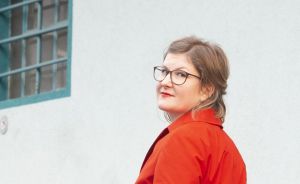Der Raum PEG 1.G 131
Der Raum ist über Aufzüge erreichbar. Es gibt zwei barrierefrei Toiletten im 1. Stock (1.G40s und 1.G40h).
Auf der Etage befindet sich eine All Gender-Toilette (1.G40n) mit Steh- und Sitzklos. Im 2. Stock des CGC befindet sich außerdem eine FLINTA*-Toilette (2.G40q).
This workshop will explore the social relations of refugees and how border regimes enact power through time. It will aks how states and laws influence connections and relationships of people on the move, but also how shifting social networks carry new possibilities for societies and refugees.
- How can we reconceptualise contemporary forms of bordering in space and time?
- (How) does a focus on time help understanding, and challenging, contemporary politics of displacement and belonging in an age of racism, imperialism and sexist violence?
The workshop is related to the book project Displacing Times: borders, time, and the social lives of refugees across Frankfurt and Istanbul. The book explores how time shapes refugees’ social lives in displacement within increasingly restrictive border regimes in Germany and Turkey. The book draws on seven months of multi-sited ethnographic fieldwork in 2021 and 2022, studying the networks, social lives and relationships of people who have fled wars, violence and persecution in the Middle East to Frankfurt and Istanbul. It explores how refugees manage state temporal mechanisms, such as insecure status, work schedules and age cut-off points, in existing and new relationships in various social contexts – the nation-state, work, families and neighbourhoods – and within structures of patriarchy, racial capitalism, and (neo-)imperialism. Overall, the book shows how bordering separates refugees from family, friends and neighbours – in space across geographies but also in time across presents, pasts and futures. At the same time, refugees work to rebuild social relations across times and spaces – through sharing moments, caring for each other over time, and working in solidarity for better futures.
In the lunch workshop, Paladia will give an insight into her research and we will discuss the main arguments of the book.
There will be lunch provided for all participants.

Bio: Dr Paladia Ziss is a Senior Research Associate in Sociology at the University of Bristol, UK. She is broadly interested in the sociologies and politics of displacement, belonging, citizenship and time. Her current postdoctoral project explores the interaction of state governance and refugees’ everyday and social lives within the postcolonial contexts of Germany and Turkey. Her work has appeared in the Journal of Ethnic and Migration Studies, Migration and Society and Frontiers in Human Dynamics, and various edited volumes and reports. With a practical background in the development and humanitarian sector, she is strongly committed to engaged, relevant and justice-oriented research.
In April and May 2025, Paladia Ziss is a guest researcher at the Cornelia Goethe Center.
